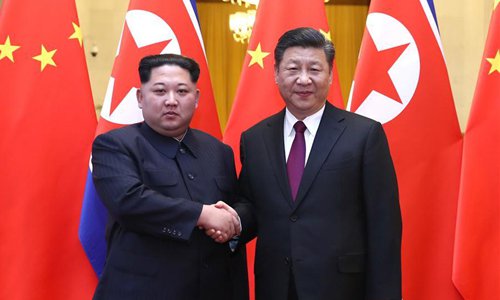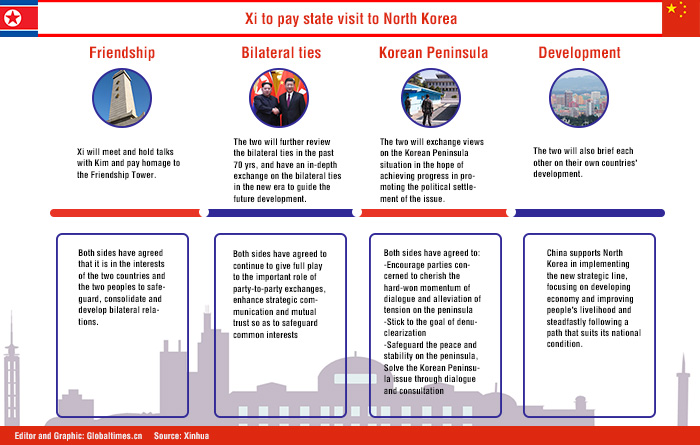Xi to boost China-NK ties
Multilateral talks might break impasse: expert

At the invitation of Xi Jinping, general secretary of the Central Committee of the Communist Party of China (CPC) and Chinese president, Kim Jong-un, chairman of the Workers' Party of Korea (WPK) and chairman of the State Affairs Commission of the Democratic People's Republic of Korea (DPRK), paid an unofficial visit to China from March 25 to 28. During the visit, Xi held talks with Kim at the Great Hall of the People in Beijing. Xi held a welcoming ceremony for Kim before their talks. Photo: Xinhua
Xi, also general secretary of the Central Committee of the Communist Party of China (CPC), in his article for Rodong Sinmun, called for new development in relations between China and the Democratic People's Republic of Korea (DPRK) in a new era to better benefit both peoples and promote regional as well as world peace, stability and prosperity.
China will unswervingly support Chairman Kim Jong-un in leading the DPRK to implement the new strategic line and focus on developing the economy and improving people's livelihoods for new and greater achievements in the socialist construction of the DPRK, Xi's article read.
Chinese analysts said that after North Korea decided to implement a new strategic line with a focus on developing its economy, improving people's livelihood and denuclearization of the Korean Peninsula, a major divergence between the two countries was gone.
Strengthening cooperation to encourage North Korea to stay on the right track and push forward the peace process for the peninsula will be the main direction for China in the future, they concluded.
Lü Chao, a research fellow at the Liaoning Academy of Social Sciences in Shenyang, told the Global Times on Wednesday that "publishing signed articles in a local mainstream newspaper is routine before Chinese leaders visit a country, but the article published in Rodong Sinmun still shows some special characteristics of the China-North Korea relationship."
For a long time, under the firm and strong leadership of the two parties of the two countries, whether in the fight to resist foreign invasion for national independence and liberation or in the work of socialist revolution and construction, the peoples of the two countries always trust, support and help each other, which guaranteed a profound friendship, Xi said in his article.
Lü said this shows that China's relationship with North Korea is more special, and that China is always a reliable and trustworthy friend for North Korea, despite divergences in the past.
"Due to the nuclear crisis in the past few years, there is no denying that we had some divergences with North Korea, but after the country decided to focus on economic development rather than its nuclear program, there is no core divergence between the two countries anymore," Lü said.
Zheng Jiyong, director of the Center for Korean Studies at Fudan University in Shanghai, said that solving security concerns, especially political security concerns, is always a priority for Pyongyang and in the past it once believed that nuclear weapons could solve those concerns effectively.
China needs to encourage North Korea to believe that economic development is the real solution to security, and Kim has made a correct decision which China will firmly support, Zheng noted.
"After the unhappy experience with the US in the past few months, North Korea might realize that China is the only reliable partner that can sincerely provide a solid and effective sense of security, which it never receives from the US and US allies," he said.

Chinese President Xi Jinping will pay a state visit to North Korea from June 20 to 21. This will be the first visit to North Korea by China's top leader in 14 years and Xi's first visit to North Korea after Kim visited China four times within a year. Photo: GT
Multilateral mechanism
Xi noted in the article it fit "our respective need for development and the common interests of our peoples to push forward the political settlement of the Korean Peninsula issue and maintain peace and stability in the region."
China will "actively contribute to regional peace, stability, development and prosperity by strengthening communication and coordination with the DPRK and relevant parties to jointly push for progress in talks and negotiations on the issue," he wrote.
Wang Junsheng, a research fellow of East Asian studies at the Chinese Academy of Social Sciences in Beijing, told the Global Times Wednesday that "the lack of trust is the fundamental reason why Pyongyang-Washington communication is facing a deadlock at this moment. To bring in a third party or bring back a multilateral mechanism is the solution when bilateral dialogue is deadlocked due to low mutual trust."
The Six-Party Talks proved that international cooperation can effectively reach an agreement on the peninsula issue with the September 19 Joint Statement in 2005 that the six parties - China, North Korea, the US, South Korea, Russia and Japan - issued in Beijing, Lü said. Maybe it is time to bring back a multilateral mechanism to push forward the peace process, he concluded.
In the long term, if relevant parties want to solve the peninsula issue, the key is to integrate North Korea into regional development and make North Korea a part of the Northeast Asian community that shares common interests, Wang said.
To underwrite North Korea's stability and development which is a shared and common regional interest, at least three neighbors - China, Russia and South Korea - could invest joint efforts in North Korea's economic potential or launch multilateral cooperation under the China-proposed Belt and Road Initiative, Wang noted.
Chinese experts believe that the China-North Korea relationship is entering a new era with higher mutual trust and closer cooperation, just as Xi wrote in his article quoting the Song of China-DPRK Friendship: "The great friendship and great common ideal we have make us invulnerably united."